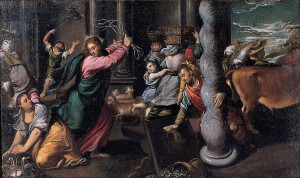This is the sixth installment in our series on undesigned coincidences in the gospels, based on a presentation by Dr. Tim McGrew. For an introduction to undesigned coincidences and this series, go here.
Tear Down This Temple
In this article, we’ll consider an undesigned coincidence between Mark 14:57-58, Mark 15:29-30, and John 2:18-20.
Let’s dive in with Mark 14:57-58 (NIV), which relates an accusation that the people made during Jesus’ trial before the Sanhedrin:
57 Then some stood up and gave this false testimony against him: 58 “We heard him say, ‘I will destroy this temple made with human hands and in three days will build another, not made with hands.’”
Later, when Jesus was on the cross, Mark also tells us in 15:29-30 that people shouted at him:
29 Those who passed by hurled insults at him, shaking their heads and saying, “So! You who are going to destroy the temple and build it in three days,30come down from the cross and save yourself!”
Mark tells us twice about this accusation against Jesus, that he had claimed he would destroy the temple and then raise it up again in three days. When did Jesus say this? What did he mean? Well, Mark never tells us. He just sticks this into his account from out of nowhere. In fact, none of the Synoptic gospels give us any insight into this.
But then there’s John’s gospel. In a seemingly unrelated event in John 2, Jesus—in a fit of anger—threw the money changers out of the temple. The people asked by whose authority he did this. Take a look at John 2:18-20:
18 The Jews then responded to him, “What sign can you show us to prove your authority to do all this?”
19 Jesus answered them, “Destroy this temple, and I will raise it again in three days.”
20 They replied, “It has taken forty-six years to build this temple, and you are going to raise it in three days?”
John’s account tells us where the accusation outlined in Mark originated. According to Tim McGrew,
It’s interesting that John gives us the original statement of Jesus but not its use as an accusation; the Synoptics give us the accusation but not the original statement. Neither of these is copied from the other.1
Once again, the gospels corroborate one another in interesting ways.
Notes:
- McGrew, Timothy (Ph.D., Professor and Philosophy Department Chair, Western Michigan University), Internal Evidence for the Truth of the Gospels and Acts, presentation to St. Michael Lutheran Church, delivered 27 February 2012, slide 37

